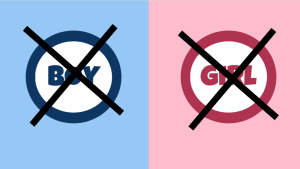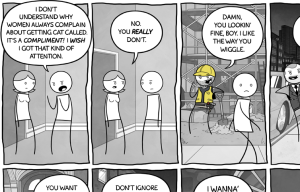When I was first trying to figure out how to come out as non-binary, (which is used for people whose gender identity doesn’t fit into the binary of woman or man and can be both, somewhere in between, or neither), I wondered if I should just come out as a transgender man.
Not because I am a man, but because I thought it would be easier for people in my life to understand.
Coming out is already a difficult thing to do, and the idea of coming out as non-binary (an identity and experience that most people haven’t even begun to grasp) was absolutely daunting.
In the end, I decided to come out exactly as I was – as a genderqueer, non-binary person. I had already spent six years being dishonest about my gender identity, and I didn’t want to spend any longer trying to navigate more lies about who I was.
Chances are, if you’re looking to come out as non-binary, you might have had similar thoughts: How can I get my loved ones to understand? What language should I use? What do I include, and what do I leave out?
Like me, maybe you’re having doubts that coming out and being understood is possible for you at all.
I recognize and validate how scary this coming out process can be, especially in a society that seldom recognizes our identities.
Having come out many times – to coworkers, friends, family, and even strangers – I’ve had a lot of experience now, both good and bad, that has helped to shape my approach. It’s my hope that, by writing this article, you can adapt some of what I’ve learned to make it work for you.
Non-binary people can come out – and they do come out.
Like them, you deserve to live your truth as openly as you desire. So let’s figure out how we can get you there!
1. Consider When (and How!) You Want to Come Out
It’s important to consider if this is the right time to come out. Will your safety be at stake if you come out? If so, do you have a place that you can go? Could you lose your job? If so, are you familiar with the non-discrimination ordinances in your city, and do they protect you?
While there is never a perfect time to come out, it’s important that your coming out does not jeopardize your physical and emotional wellbeing.
Coming out can happen in a lot of different ways. You can come out in conversation, in a letter, on the phone; it can be a Facebook post that everyone sees, or an e-mail that goes to a select few individuals. There are many ways of going about it, and the results can be very different.
My personal preference is starting with a letter (or e-mail). You can always plan any necessary follow-up conversations after everyone has had time to reflect on what you’ve shared. The letter gives you space to explain things in the exact way you’d like, without interruption or heckling, and you won’t be forced to improvise in the moment.
The key is finding a format that makes you feel as safe as possible.
What setting would make you feel the most at ease? Coming out can be difficult, but if you can take control of the circumstances, it will make the process a little bit easier.
2. Keep It Simple – They’ll Ask You Questions No Matter What
A lot of non-binary folks who are coming out ask me, “Where do I even begin?”
It can be intimidating to come out as non-binary in particular because it feels like there’s so much to explain. But if you overload your loved ones with information, none of it will stick. I’ve found that it’s best to keep things as simple as possible, and open up the more nuanced stuff later.
If you had to explain your gender in four sentences, how would you do it? Try following this format and see what you come up with:
1. What you are not: “A lot of people perceive me as…”
2. A word that describes what you are: “I’ve been trying out the word ____ to describe my gender.”
3. Clarification on what that word means: “To me, this word means…”
4. Why this is important. : Explain how being non-binary has made you feel, using the words “I have felt…” You could talk about how happy your non-binary identity makes you, or about how difficult it has been for you… or maybe both!
For example, in my coming out, I explained it like this:
“Even though you may see me as a woman, on the inside, I am not a woman and I am not a man. I’ve been using the word ‘genderqueer’ to describe my gender, which means that I don’t identify with either. If you placed me on a spectrum, with ‘masculine’ being at one end and ‘feminine’ being at the other, I’m somewhere in-between. Identifying as genderqueer has made me feel so much better because being seen as a woman made me feel so distressed and unhappy.”
This is by no means my ultimate truth, and there’s obviously more to be said. But the goal of your coming out is not to educate everyone perfectly. Instead, all you need to do is invite people into the conversation.
Once you’ve put together those main points, you can expand on them however you feel it’s needed.
3. Find an Analogy That Frames the Conversation
Using analogies can help people understand a little better what you’re talking about when it comes to non-binary gender. Because, let’s face it, gender can be complicated.
For example, in her video on non-binary identity, Justin uses an analogy that involves colors to talk about how gender is actually more of a spectrum. Some of us are reds, some of us are blues, but there are lots of us who are purples. This is a simple, but great analogy that many folks can understand.
If you’re not digging the color analogy, I’m personally a big fan of the hotdog analogy.
Imagine if someone just assumed that you liked ketchup on your hotdogs without even asking you. For your entire life, they refused to put anything on your hotdogs but ketchup – even though you know, deep down, you like relish.
Finally, you decide to come out and say that you like relish. But every time you ask for relish, people say to you, “If you don’t like ketchup, you must like mustard. There are only two options.”
There are obviously more than two ways to eat a hotdog, just like there are more than two ways to express and explore gender, but society seems fixated on hotdogs with ketchup or mustard – and nothing else.
Similarly, society seems to think there are only two valid options when it comes to gender – man or woman – when there are actually lots of other ways to embody gender, and even ways of having no gender at all.
Yes, these might feel like oversimplified explanations.
But it’s important to remember that while many of us have had years to reflect on and learn about gender, a lot of the people we are coming out to have not had all of that time to learn and grow.
4. Have Some Resources On Hand
Of course, it’s not your responsibility to educate folks, but it might be helpful to bring in some outside sources for your loved ones to peruse on their own.
Some of my favorites:
This non-binary 101 video by the lovely Justin Dennis.
This piece I wrote about how to support a non-binary partner, which includes advice that’s just good for any loved one, really.
These myths about non-binary people that Adrian Ballou completely shattered.
And, of course, you can’t go wrong with the non-binary gender wiki.
You don’t want to overwhelm folks with a million resources. Just start with a few, and see what happens!
5. Be Honest About Your Feelings
A lot of this gender stuff may feel confusing for folks, and they may not feel prepared for it. But I can’t emphasize this bit of advice enough: Even when people don’t understand your gender, it’s important that they understand what you’re feeling.
People are much less likely to write this off if they understand how important this is, and they’ll only understand its importance if they understand the feelings behind what you’re saying.
In my coming out, I used a lot of “I felt” and “I feel” statements. For example, “I felt afraid that if you knew who I really was, I would lose you” or “I felt so alone, but I’m hopeful that now I won’t be.”
In coming out, it’s not necessarily important that your loved ones understand immediately. If they can recognize that your feelings about it are real and important, the understanding can come later on.
It’s also more likely that they’ll want to understand why you felt this way if they have some insight into your experience.
6. Be Explicit About What Your Needs Are
It’s important that you’re clear about what your expectations are moving forward. When I came out to my family, I created a numbered list of three important things I needed them to work on.
Moving forward, there are some things I need you to work on if we’re going to have a loving and respectful relationship: 1) For my happiness and my wellbeing, I need to start testosterone; 2) I also hope that someday soon, you’ll be able to change the language that you use when you talk about me; and 3) I need you to accept the way that I express myself.
In the list, I also made sure that I explained why it was important to do these things, and how I felt when my needs were ignored.
This made it easier for my loved ones to understand what I needed – and more importantly, the hurtful impact their actions had when they didn’t try to change that behavior.
7. Remember That They May Not Understand at First – And That’s Okay
I can basically guarantee you that you will come out more than once. Sometimes it involves many conversations over a long period of time. And if someone is hostile or uncertain at first, that doesn’t mean that they will never understand or respect you.
Sometimes the first reactions that we get to our coming out are not actually reflective of the growth this person will have as time goes on.
That being said, if someone refuses to use your pronouns, insists on misgendering you, or otherwise creates an unsafe environment for you, be prepared to set some boundaries.
If someone isn’t giving you the space that you need, isn’t respecting your privacy, or is making you feel guilty for simply being who you are, yes, be prepared to set some boundaries.
Never apologize for asking for distance, or cutting someone out of your life (permanently or temporarily) because they refuse to respect and validate you.
You are allowed to do whatever it is you need to so that you can be safe, healthy, and happy. Don’t allow anyone to tell you otherwise.
8. Have Some Aftercare in Place
If you know that you’ll be coming out soon, have plans in place so that you can take care of yourself afterward. Even if you anticipate it going well, coming out can be an emotionally difficult process, and it will require a lot of self-care.
Do you have a friend that you can call afterward to talk it out? Is there someone you can meet up with after to do something fun? Is there a place you can go, a safe space to retreat to, after you’ve sent that letter or had that conversation?
Regardless of the plan, make sure you have something in place so that you can relax and heal after any potential stressors or microaggressions you may encounter.
Your mental health matters – make sure it’s a priority!
***
Coming out as non-binary presents a whole host of challenges than many other trans people don’t encounter. This can sometimes discourage us from coming out; we often wonder and worry if anyone will understand or if it’s even worth it to tell others who we are.
I want to validate those feelings. That fear and anxiety is very real, and it’s something that I’ve certainly felt throughout the last few years.
However, I also want to assure you that many non-binary people have come out, exactly as they are. It can take time, but sometimes our loved ones really do come around – yes, even the folks who we least expect to understand it can surprise us the most.
No matter how you decide to come out, I hope you find the validation and support that you’re looking for. You are so worthy and deserving of it!
If you are facing rejection and need guidance, please check out this article for more support.
[do_widget id=’text-101′]
Sam Dylan Finch a Contributing Writer for Everyday Feminism. He is queer writer, activist, and educator based in the San Francisco Bay Area. In addition to his work at Everyday Feminism, he is also the founder of Let’s Queer Things Up!, his hella queer and very awesome blog. You can learn more about him here and read his articles here. Follow him on Twitter @samdylanfinch.
Search our 3000+ articles!
Read our articles about:
Our online racial justice training
Used by hundreds of universities, non-profits, and businesses.
Click to learn more





















